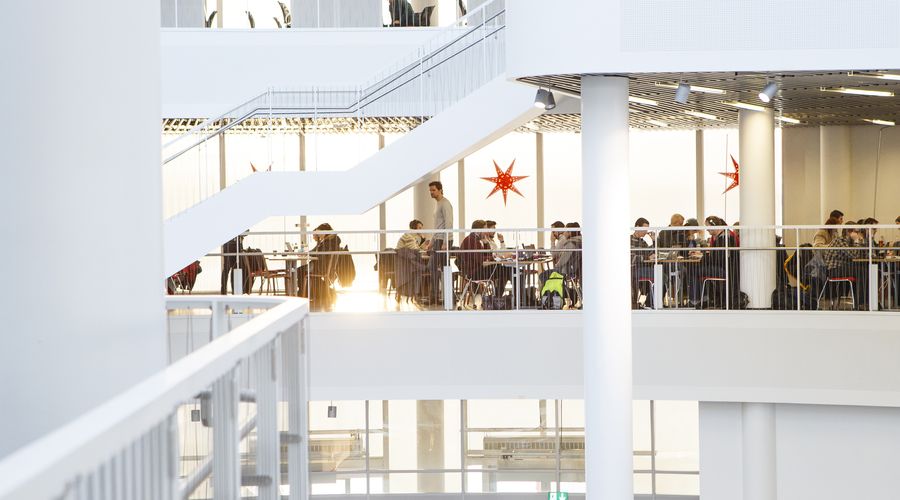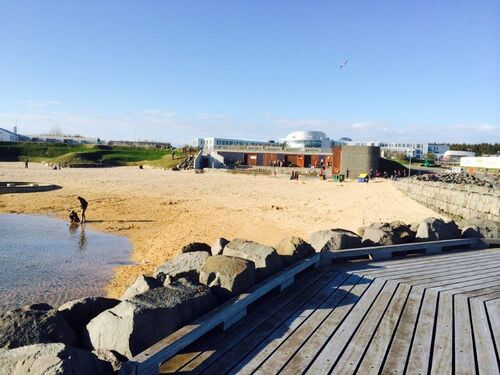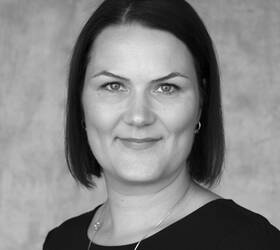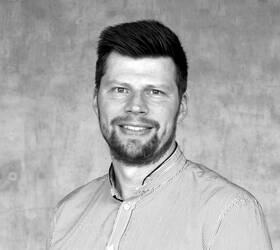Innovation Management
Do you want to shape the future?
Innovation Management at RU aims to prepare students, not only to adapt to rapid change, but more importantly, to shape it. The program builds on the most recent knowledge and methods in the field to enhance students' innovative and managerial skills and competencies. The program draws on the expertise of local and international faculty; as well as utilizing RU's and the faculties' strong ties to various organizations and practitioners.
Overview

New study program as of fall 2018: Innovation Management (MSc) and Master of Innovation Management (MINN).
Choice between MSc and Qualification at master level
Students can choose between a program structure that leads to an MSc degree and a program structure as qualification at master level (MINN). Both structures include 90 ECTS credits. Full-time study includes three terms: fall, spring, and summer term.
MSc degree
Students finish 60 ECTS credits in courses according to the program structure and a 30 ECTS-credit master‘s thesis.
Qualification at master level (MINN)
Students finish 90 ECTS credits in courses according to the program structure. Students have the opportunity to take an internship of up to 15 ECTS credits.
Dean's Selection Grant for RU Department
of Business Administration graduate students
The recipient of the Dean´s Selection Grant pays undergraduate fees instead of graduate fees. Students with the highest grade in a graduate programme each semester are applicable. In order to receive the award students must complete 30 ECTS units per semester and follow the programme structure.
More information about the grant
Information for current students
Careers
It is argued we are witness to the largest economic, technological, and social changes in modern history, which is already revolutionizing both our jobs and personal lives. Future careers, products/services and organisations are largely unknown, as they do not yet exist. It is no longer enough only to prepare for currently defined roles.
University graduates, whether they want to start their own business or become managers in established organisations, need to embrace the change as a source of new opportunities. They need to have the ability to take initiative, inspire others and manage collaborative efforts towards innovation.
Innovation is at the core of any organization: its creation, sustainability, and growth. The master's program in Entrepreneurship and Innovation Management prepares students to lead innovation and entrepreneurial processes in various organisational settings, including of established corporations, start-ups, public organizations, and NGOs.
Academic staff
The focus of staff research is on innovation and entrepreneurship, finance and economics, corporate governance, marketing and human resource management. RU Department of Business Administration is committed to excellence in research and academic staff collaborates with researchers in other fields such as Computer Science and Psychology, within RU and internationally. Students also benefit from the Department's extensive network of international professors and guest lecturers from the business community.
Academic staff at RU Department of Business Administration, graduate study
Core Program Faculty
- Marina Candi, Professor
- Hallur Þór Sigurðarson, Assistant Professor
- Dimo Dimov, Professor
Internship
A great opportunity
By completing an internship a student's knowledge, skills and abilities are enhanced. This is usually done through hands-on projects, and so, graduates are better prepared for their future careers. Students are assigned a supervisor within a company or institution and a full-time faculty member as a supervisor during the period of the internship.
Credits
Students can complete 7,5 ECTS, 15 ECTS, or 30 ECTS, depending on the length of the internship. Internships of 30 ECTS are only available for students that complete their internship abroad. Generally, internships are unpaid.
Students can choose between three options:
Option 1: Students apply for internship positions arranged by RU Department of Business Administration with Icelandic companies.
Option 2: Students arrange an internship with companies themselves and get the internship approved by RU Department of Business Administration.
Option 3: Students find international internships themselves, and get it approved by RU Department of Business Administration.
Examples of companies and institutions where students have completed their internships
Icelandair Group • Icelandair London • Icelandair Frankfurt • Össur • KPMG• Deloitte • PwC • E&Y • Landspítalinn • Síminn • Orkuveita Reykjavíkur • NOVA • Vodafone • Vífilfell • Ölgerðin • Virðing • Sameinaði lífeyrissjóðurinn • Pipar TBWA • Icelandair • Landsvirkjun • Advania • Alvogen • Landsbankinn • Mannvit • Nýherji • Reiknistofa bankanna • Eik fasteignafélag • Grant Thornton • Glamour • BDO • Sjóvá • Canadian Embassy • Viðskiptaráð • FESTI • Samtök Iðnaðarins.
Internships abroad
Students can apply for an Erasmus grant to complete an internship in Europe for 2-12 months. Students who have previously been in the Erasmus exchange program can apply for funding for an internship.
The amount of the grant depends on the destination, but is in the range of 450 to 550 € a month. Students also receive a travel grant, in the range 275- € 1,100 depending on the destination.
To find an internship, a number of websites can be referenced:
- NAFO
- Leo-Net Job Offer Exchange
- Placement UK
- Europe Internship
- Euro Pages
- Global Placement
- Spain Internship
- Philox Connecting Europe
- AIESEC
- Global Internships
RU students completing an internship abroad have generally received Erasmus grants. However, if the demand increases, students can apply for the Nordplus grant. For further information, visit the International Office at RU.
Structure
The program is offered as full-time study program; part-time study is allowed. Maximum study period: 6 semesters; if the study period exceeds this limit, the student must apply for re-enrollment.
Choice between MSc and Qualification at master level
Students can choose between a program structure that leads to an MSc degree and a program structure as qualification at master level (MINN). Both structures include 90 ECTS credits. Full-time study includes three terms: fall, spring, and summer term.
MSc degree
Students finish 60 ECTS credits in courses according to the program structure and a 30 ECTS-credit master‘s thesis.
Qualification at master level (MINN)
Students finish 90 ECTS credits in courses according to the program structure. Students have the opportunity to take an internship of up to 15 ECTS credits.
Term structure
Full-time study includes 30 ECTS credits per term.
- Fall term: August-December.
- Spring term: January-May.
- Summer term: June-September.
Maximum study period
The program structure follows the idea of full-time study, but students have the opportunity to study part-time. The maximum study period is six terms (two years).
Programme Structure
| MSc | ||
|---|---|---|
| Autumn | Spring | Summer |
|
|
|
| * For students with a bachelor's degree that includes less than 30 ECTS credits in business administration |
| MINN | ||
|---|---|---|
| Autumn | Spring | Summer |
|
|
|
| * For students with a bachelor's degree that includes less than 30 ECTS credits in business administration | ** Maximum 15 ECTS credits can be used for internship. |
Exchange
Students can pursue part of the program as an exchange student at another educational institution; this opportunity relates in particular to the second semester (i.e. spring semester) or the third semester (i.e. summer semester) of the study program.
Facilities
Our University building offers an optimal study environment. Support services, study areas, coffee shop and gym.

IT facilities
Our IT Services provide a range of computer facilities to help you study. IT suites are located across campus – many with 24-hour access.
IT facilities also include:
- Wireless network
- Extensive printing facilities
- Adapted PCs for students with disabilities or additional learning needs
Student study areas
Students have 24-hour access, during term time, to group rooms and private study desks. There is a especially dedicated study area for Graduate students.
Student Union
The University of Reykjavik Student's Union is the focus of many student activities on campus.
Sports Facilities
In the basement of the university, World Class runs a gym which offers discounts to students.
Food
There are three shops and cafés in the building that sell food and beverages to students.
- Kaffitár sells a selection of coffee drinks, light snacks and bakery products.
- Malið serves hot food everyday, plus snacks and refreshments.
- The University shop (Haskolabudin) sells groceries, household items and snacks.
Reykjavik University Campus
Set in one of the most beautiful areas of Reykjavik right next to Iceland's only geothermal beach, the newly built campus offers students modern first-rate facilities. The building has well equipped classrooms and students have 24-hour access to the spacious study facilities.
Environmentally conscious
The campus is one of Iceland's most automated buildings designed to provide an environment optimal for working using the lowest amount of energy.
Automated blinds and windows
In the main areas of the building the blinds and windows are controlled by a weather station positioned on top of the University roof. The weather station collects information about wind direction and outside temperature adjusting windows accordingly, and blinds are automated to ensure direct sunlight does not disturb students working.
A breath of fresh air
The University building is constantly ventilated with natural fresh air using the NAVENT system. Fresh air is drawn into the building and then pumped into the rooms. Special CO2 monitors ensure the correct levels of oxygen in the rooms. Heaters ensure that the air pumped into the rooms maintains the correct air temperature. In the summer time the air pumps drag warm air from the building and pump fresh and cooler air in its place.
Intelligent lighting system
Every light in the University has its own IP address and is controlled by the automated system. Light sensors ensure lighting is only on when rooms are in use. Large windows let in natural daylight which creates a more pleasant working environment.

Beautiful surroundings
Our campus is in a unique position of being set in one of the most popular outdoor areas of Reykjavik.
- The University of Reykjavik is located right next to Iceland's only geothermal beach, Nauthólsvík. Students can enjoy swimming in the geothermally heated sea, or relax in the hot tub on the beach.
- Right next to the campus is the most environmentally friendly restaurant in Reykjavik, Nauthóll, which has been awarded the Nordic Environmental "Svan Certificate," and was the first restaurant in Reykjavik to receive this certification.
- Students can enjoy the many foot and bicycle paths in the neighbouring forest.
- Students can visit the nearby Perlan situated on top of the city's geothermal storage tanks.
Admissions
Application deadline
The application deadline is April 30. Applicants from outside the EU/EEA must submit an application prior to February 1.
Admissions requirements
- Bachelor's degree (at least 180 ECTS credits).
- Students with a bachelor's degree that includes less than 30 ECTS credits in business administration are required to take an intensive preparatory course in business administration organized by RUSB before the start of the study program, and to take the course Fundamentals in Accounting and Finance (7.5 ECTS credits) in the first semester of the study program
- Generally we require a first-class grade (GPA 7.25 or above) according to Icelandic grading scale in an undergraduate programme. Further education and professional experience benefit applicants in the evaluation process.
- Excellent English language skills.
Applications and accompanying documents
All applicants must submit an electronic application and attach the required accompanying documents. The following documents need to accompany applications (they should be supplied in English):
- Curriculum vitae with a photograph.
- Official university transcripts of records and diplomas.
- Personal statement (Why are you applying to the programme and what is your aim in pursuing the programme? [up to 300 words in English]).
- Contact information for one to two individuals who can assess the ability of the applicant to pursue the programme. A letter of recommendation may be required.
-For students whose first language is not English proof of English proficiency must be provided, based on, e.g., TOEFL or IELTS.
Accompanying documents need to be submitted by the application deadline. Applicants are only summoned for an interview if they have submitted all required accompanying documents on time.
Tuition fees and evaluation of previous studies
Information about tuition fees: Tuition fees
Evaluation of previous studies: If students have completed university-level courses, they can apply for those previous studies to be evaluated for transfer of credit.
Rules and form for evaluation of previous studies.
Contact us
Got any questions?
We welcome enquiries via e-mail or phone.



Laufey Bjarnadóttir (on a leave)
Programme Administrator


